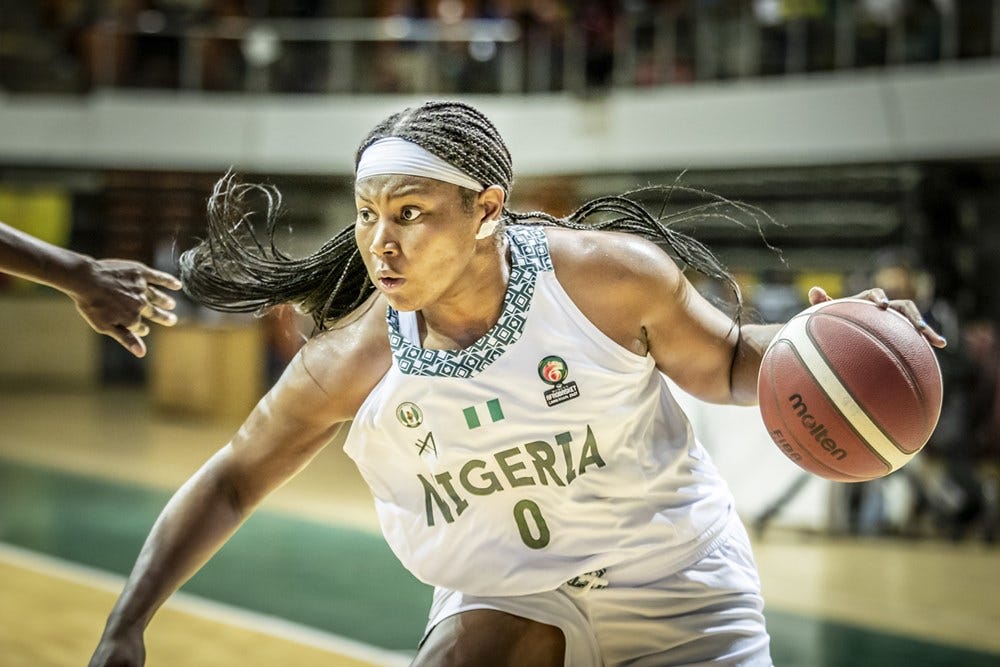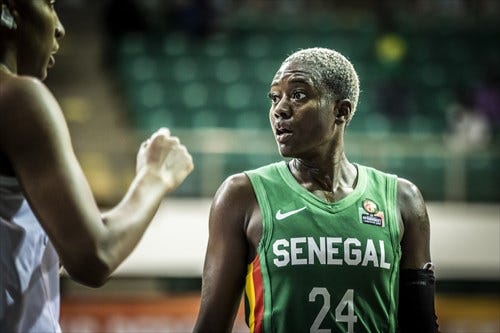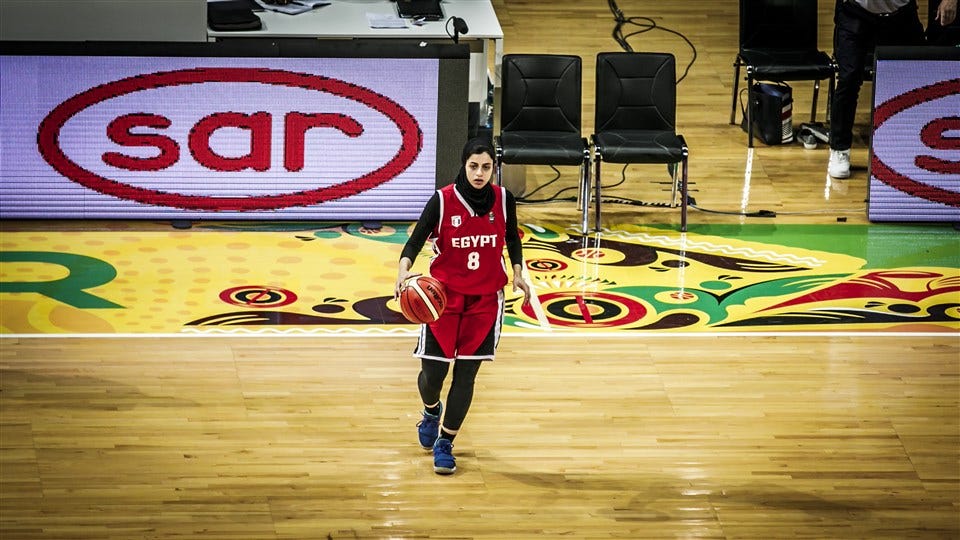FIBA Women's AfroBasket 2023 Preview
Previewing this year's African continental competition
Thanks for reading the Her Hoop Stats Newsletter. If you like our work, be sure to check out our stats site, our podcast, and our social media accounts on Twitter, YouTube, Facebook, and Instagram. You can also buy Her Hoop Stats gear, such as laptop stickers, mugs, and shirts!
Haven’t subscribed to the Her Hoop Stats Newsletter yet?
The final continental competition of the summer, the FIBA Women’s AfroBasket 2023, begins on Friday. This may be the least predictable of the four continental competitions because of its short, regionalized qualification tournaments, and its three-team pool play groups leave teams with only a three-game guarantee even with every team advancing to the knockout stage. (Edit. The original article erroneously said that teams only had a two-game guarantee.) Furthermore, unlike the other tournaments, preliminary rosters were not posted to the tournament website in advance, making it more difficult to see exactly who will be playing. Finally, Africa will also send the fewest teams to the Olympic Qualifying Tournaments, two. That all leaves the AfroBasket with plenty of intrigue from start to finish. The tournament, held in Rwanda, begins on Friday at 5:30 a.m. ET, and all games can be streamed with a paid subscription to Courtside 1891. Here are some questions to monitor:
Who will step up for Nigeria?
Nigeria has dominated the AfroBasket competition in recent years, winning each of the last three competitions. While its rebounding has been its best skill upon advancing at the global level, the key to its success in Africa has been its balance between perimeter and interior play, notably finishing second in 3-point attempts per game and first by a significant margin in 3-point percentage at the 2021 competition. However, there will be some significant changes, as six of the team’s top seven scorers from that last competition are not on this year’s roster. These changes are especially notable in the backcourt as traditional leaders Ezinne Kalu and Promise Amukamara are both off this year’s roster. Candidates to step up include Sarah Ogoke - who has been a mainstay on the team’s bench - recent Duke graduate Elizabeth Balogun, and - in her first major tournament for Nigeria - recent Iowa and TCU graduate Tomi Taiwo. Elsewhere, power forward Pallas Kunaiyi-Akpanah has built a resume as one of the world’s best rebounders while forward Amy Okonkwo stands out as a clear candidate to lead the team in scoring. Nigeria should still be expected to finish in the top two and advance to the Olympic Qualifying Tournaments, but there may be some growing pains as players take on new roles.
Can Mali’s Maimouna Haidara be the breakout star of the tournament?
Mali finished second at the previous AfroBasket in 2021 and was the continent’s lone representative at last year’s World Cup after Nigeria declined to participate for administrative reasons. At both of those tournaments, Chicago Sky power forward Sika Kone was one of the team’s stars. While Kone was featured in the team preview article on the tournament’s official website, it appears unlikely that she will play at the tournament. Less than 36 hours before the tournament’s official start, the Sky still have not temporarily suspended Kone as would be expected were she to participate. Regardless of Kone’s presence, Maimouna Haidara seems primed to take on a major role for Mali. Haidara, eligible for selection in the 2024 WNBA Draft, played the third-most minutes for Mali at last year’s World Cup and has followed that with a strong performance at the U19 World Cup earlier this month. Haidara made the tournament’s All-Second Team while leading the competition in steals per game and finishing second in rebounds per game. Djeneba N’Diaye is the team’s best guard and was its leading scorer at the last AfroBasket.
Can Senegal once again challenge for the title?
Senegal joined Nigeria at the 2018 World Cup in putting together a historic performance for African countries as both teams made it out of the group stage. However, while Nigeria has built upon that success in the succeeding years, Senegal’s aging roster took a step back, failing to make the Olympic Qualifying Tournaments for the Tokyo Games and finishing fourth in Africa in 2021. This transition has continued in recent years with the retirements of floor-spacing forward Mame-Marie Sy-Diop and point guard Bintou Dieme. One of the team’s two double-figure scorers in 2021, Sy-Diop’s combination of size and outside shooting allowed her to occupy a role that is especially privileged at AfroBasket, while Dieme led the tournament in assists with 5.8 per game. However, a new addition who could add a major jolt to the Senegal team is recently naturalized point guard Cierra Dillard. A former second-round WNBA draft pick, Dillard last played in Egypt and averaged 19.2 points per game at the African Champions Cup. Another former NCAA player, wing Yacine Diop, should also be in a prime position to lead the team, although Dillard’s presence makes her less likely to repeat her role as the team’s leading scorer. However, a third player will likely need to step up for Senegal to make a legitimate run at the top spot.
Can Cameroon maintain their momentum from their bronze-medal performance in 2021?
After finishing in the bottom half of the competition in 2017 and 2019, Cameroon returned to the podium with a third-place finish in 2021. However, two key factors complicate their chances of repeating. The first is that the 2021 tournament was held in Cameroon, so the team will lack that crucial homecourt advantage. The other is the apparent absence of Seattle Storm rookie center Dulcy Fankam Mendjiadeu, who nearly averaged a double-double across the team’s five games. However, the team still has plenty of talent. Like Senegal, Cameroon has also recently naturalized a talented American point guard in Jessica Thomas. Thomas has established herself as a table-setter for teams at or near the level of EuroLeague Women, including serving as a late-season addition this past season to French club Lyon, a team that features past- and present-WNBA players like Gabby Williams, Marine Johannes, and Blake Dietrick. The team also includes power forwards Marguerite Effa and Marina Ewodo who each averaged more than three assists per game this past season in Greece.
Can Egypt take a leap led by its talented guards?
The 2021 competition’s leading scorer was not one of the many talented post players or someone from one of the highest-finishing teams. It was 5-foot-11 Egyptian wing Nadine Mohamed (Soliman). Egypt also has featured one of the continent’s most exciting players in flashy ball-handling guard Soraya Degheidy. Moreover, especially before the recent increase in the naturalization of U.S.-born players, Egypt has had one of the continent’s more successful recent NCAA players in former Western Kentucky center Raneem Elgedawy. However, while all three players made a major impact in Cameroon in 2021, the team as a whole only managed a sixth-place finish. It led the tournament in points per game, but this was the result of playing up-tempo, high-possession games rather than sheer efficiency. A potential addition to the Egypt squad will be Elgedawy’s Western Kentucky teammate, Meral Abdelgawad, giving Egypt a potent trio of attacking perimeter players which few of their opponents can match. Egypt’s high-flying attack could give opponents trouble, but it remains to be seen if it can crack the podium for the first time since its second-place finish in 1977.
How important will the return of Leia Dongue be to Mozambique?
In 2021, Mozambique finished in fifth place, and its top performer was 5-foot-10 wing Ingvild Mucauro, the team’s lone double-digit scorer who was also among the tournament leaders with 3.3 steals per game. However, its most impactful player, post scorer Leia Dongue, was absent, and her presence was clearly missed. Dongue is playing as well as she ever has, averaging 16.0 points per game in the highly competitive French league, and will provide another source of potent scoring punch. The team also continues to feature former UTEP power forward Tamara Seda, giving the team a strong top three which should help the team challenge for the podium.
Thanks for reading the Her Hoop Stats Newsletter. If you like our work, be sure to check out our stats site, our podcast, and our social media accounts on Twitter, YouTube, Facebook, and Instagram.




